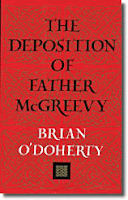 David Pilling's journalism caught my eye with his account of lunch with the novelist David Mitchell.
David Pilling's journalism caught my eye with his account of lunch with the novelist David Mitchell.So a few days ago I asked him what he was reading. His reply:

Because of my job, Tokyo bureau chief of the Financial Times, I read a lot of non-fiction about Japan both in English and Japanese. I tend to have several books on the go at once, which is probably not a good thing. At the moment, these include (in no particular order) Alan Macfarlane's Japan Through the Looking Glass, a book that grapples intelligently with the question of just how different is Japan; Totetsumonai nihon (Incredible Japan), a book by Taro Aso laying out his bid to be the next p"Lunch with the FT" isn't always free, but you can always have a taste of Pilling's account of lunch with David Mitchell.rime minister; A History of Japan to 1334 by George Sansom, the first part of a three-part classic.
I have just finished the diaries of Alastair Campbell, Tony Blair's spin-doctor in chief. This was a fascinating if somewhat self-serving account of the Blair Years, but it includes a lot of Clinton, Bush, Iraq and Ireland as well. A really interesting read.
I also try to keep up with fiction, but not very successfully. For work (though it turned out for pleasure) I recently read three David Mitchellnovels, the best of which was Cloud Atlas followed by Black Swan Green, the latter a much more personal childhood autobiography than his usual romps through time and space.
I would like to go back and read Turgenev's books, especially Fathers and Sons. I also love Chinua Achebe, especially the marvellous Things Fall Apart.
--Marshal Zeringue


















































